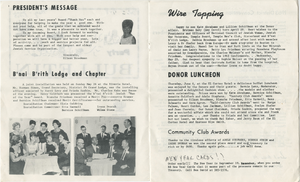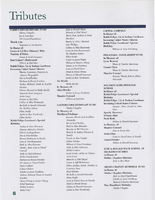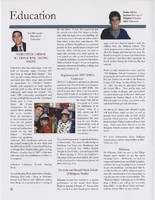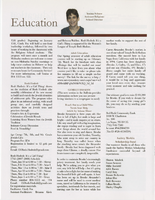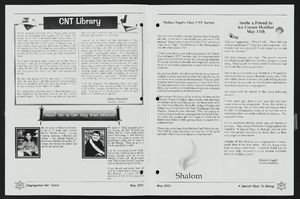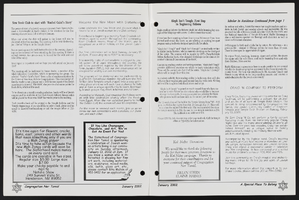Search the Special Collections and Archives Portal
Search Results

Transcript of interview with Flora Mason by Barbara Tabach, December 8, 2014
Date
Archival Collection
Description
Flora Mason (1940- ) is a Las Vegas, Nevada philanthropist and community leader. She was born Florica Esformes to a Sephardic Jewish parents who emigrated from Greece to New York. This Mediterranean influence can be seen in the meals she serves for the Jewish holidays. Flora?s grandfather had a pushcart business in New York and her father became a produce broker, which led the family to Miami, Florida. She graduated from high school in Miami and also met Stuart Mason there. The young couple married in 1958. They had been married for 58 years when Stuart passed away in 2012. In this oral history, Flora recalls her life?from witnessing signage that read: no blacks, no dogs, no Jews in the South to meeting her husband while a teenager to raising her three children in Las Vegas. Along the way, she has always found time to form fast friendships and to inspire productive community organizations. v For example, Flora and Stuart founded the Las Vegas Chapter of the Juvenile Diabetes Foundation in 1970. It was a disease that their daughter Deborah had suffered from. They also established the Mason Undergraduate Peer Coach Program at University of Nevada, Las Vegas Libraries in 2006. Flora was the first woman elected by the general membership to serve on the Temple Beth Sholom Board of Directors. She has served on the National Board of Directors of the Juvenile Diabetes Research Foundation, been involved with the Jewish Federation of Las Vegas, the Anti-Defamation League among many other Jewish and non-Jewish community organizations. Flora?s college education began at the University of Miami and focused on completing both her undergraduate and graduate degrees at UNLV, where she majored in English literature. She then became a lecturer in the UNLV English department from 1985 to 1993. Flora and Stuart Mason had three children: sons William and James who joined the family?s successful three-generation commercial construction business Taylor International, and daughter Deborah. In this oral history, Flora shares the joy of being a grandparent, her love of travel, and the opportunities of meeting Israeli dignitaries over the years. She also candidly reflects on dealing with grief and the Jewish rituals surrounding death.
Text

Transcript of interview with Valerie Wiener by Barbara Tabach, January 20, 2015
Date
Archival Collection
Description
Valerie Wiener is an accomplished state senator, business owner, president and founding member of the Public Service Institute of Nevada and the Valerie Wiener Foundation. She was born October 30, 1948 in Las Vegas, Nevada. Her service as senator for 16 years and her role as a public servant led her to become the first woman assistant majority leader of the state senate in Nevada. She graduated with a bachelor degree of Journalism at the University of Missouri/Columbia within the School of Journalism earning a Masters of Arts in Broadcast Journalism and a Master of Arts in Literature at the University of Illinois in Springfield while attending law school at McGeorge School of Law in Sacramento in the 1970s. Her generosity is also seen through scholarships and activities at the Louis Wiener Jr. Elementary School. In addition, Valerie is a professional speaker, consultant, and internationally published author. She is the recipients of many awards, such as: ?Women of Achievement Award? in Media; ?Healthy Schools Heroes?; ?Public Affairs Champion Award?; ?Legislator of the Year?, and the Nevada Secretary of State?s recipient of the ?Jean Ford Participatory Democracy Award.? She stays active through her commitment to the Nevada Senior Olympics for both Fitness and Weightlifting earning 17 gold medals from 1998 to 2007. In this interview, Wiener discusses her childhood and being raised in Las Vegas in the 1950s as well as the academic path that led her career into politics. She shares memorable insight into the life of her father, Louis Isaac Wiener, Jr., an accomplished attorney and business man who represented the infamous Benjamin ?Bugsy? Siegel during the construction and opening of the Flamingo Hotel and Casino in 1946. Throughout Wiener?s interview, she highlights the traditions of the small, but growing Las Vegas Jewish population in the 1960s. Among the people she recalls most vividly is her grandmother Kitty Wiener. Wiener also discusses her community service work and her life mantra of giving.
Text

Transcript of interview with Lynn Leshgold Rosencrantz by Barbara Tabach, January 7, 2016
Date
Archival Collection
Description
In this interview, Rosencrantz discusses at length her involvement as a founder of the city?s Jewish Federation?s Young Leadership Program, including other local leaders she worked with to promote Jewish community engagement in Las Vegas. She also talks about her spiritual journey as an adult, leading to her participation at Stillpoint Center for Spiritual Development.
Text

Transcript from interview with Mike Unger by Barbara Tabach, January 21, 2016
Date
Archival Collection
Description
In this interview, Unger reflects upon his long and successful career in hotel management in Las Vegas and also in Arizona and Pennsylvania. He shares stories as a local celebrity, particularly in the 1970s and 1980s when he worked at Caesars Palace, as well as the big projects he oversaw, including organizing the first big fight nights, World Series of Tavern Poker and Grand Prix race. He talks about working with Morris Shenker, Moe Dalitz, Cliff Perlman and Billy Weinberger, and the role of the Jewish community in the city, and specifically in the gaming industry. Unger also discusses his non-gaming industry ventures which have included a satellite communications business and a bagel business.
Mike Unger was born in Queens, New York in 1947, and spent most of his childhood in Long Island, growing up in a predominantly Jewish and Italian community. As a young adult, Unger was already working hard, running one of his family?s restaurant after school. When he was in high school, his family moved to Los Angeles to accommodate his father?s health needs, and eventually end up in Las Vegas by 1967. Over the next two decades, Unger would work at nine properties in the city. Unger is one of the University of Nevada, Las Vegas? first hotel management graduates, and started his career with Summa Corporation in its management training program at the Frontier Hotel and Casino. After a brief stint at the Airport Marina Hotel in Los Angeles in 1972, Unger returned to Las Vegas, serving in management capacities at the Aladdin Hotel and Casino, Summa Corporation headquarters and Landmark Hotel and Casino. In 1978, he joined Caesars Palace Hotel and Casino management team, and was integral in creating the city?s first large boxing events, the World Series of Tavern Pool, and the Grand Prix race. Unger also ran properties for the White Mountain Apache and Colorado River Indian Tribes in Arizona, as well as the Showboat Hotel and Casino. In this interview, Unger reflects upon his long and successful career in hotel management in Las Vegas and also in Arizona and Pennsylvania. He shares stories as a local celebrity, particularly in the 1970s and 1980s when he worked at Caesars Palace, as well as the big projects he oversaw, including organizing the first big fight nights, World Series of Tavern Poker and Grand Prix race. He talks about working with Morris Shenker, Moe Dalitz, Cliff Perlman and Billy Weinberger, and the role of the Jewish community in the city, and specifically in the gaming industry. Unger also discusses his non-gaming industry ventures which have included a satellite communications business and a bagel business.
Text

